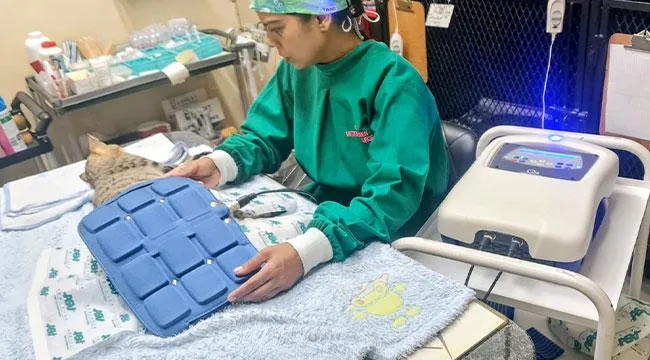The golden years: Why pet insurance matters for senior pet care

A senior cat receiving magnetotherapy, the first of its kind in South Africa.
Image: Supplied
As our beloved companions enter their golden years, their needs shift in subtle yet significant ways. Senior pets may nap more, play less, or move with a little extra stiffness, but behind those greying muzzles lie a lifetime of love that deserves compassionate, proactive care.
Understanding the needs of senior pets helps pet parents provide comfort as their pets age, and having pet insurance in place means the costs don’t have to get in the way of quality treatment.
At what age is a pet considered a senior?
Ageing varies between breeds and sizes. Small-breed dogs are generally considered seniors around 10 to 12 years of age, while medium-sized dogs reach that stage between 8 and 10. Larger breeds, such as Labradors and Rottweilers, tend to age faster and are often considered senior from about 6 or 7 years old. Cats, though more graceful in their ageing, typically join the “senior” ranks around 10 years old.

Dr Salosh Saimen, founder of Animal Zone Veterinary Hospital.
Image: Supplied
The importance of senior pet care
Senior pet care is about more than managing age-related illness; it’s essential for preserving quality of life. As the years go by, their metabolism slows, joints stiffen, and senses decline. Common health problems in senior pets include arthritis, dental disease, kidney and heart issues, thyroid imbalance, and vision or hearing loss.
Regular checkups, ideally every six months, allow vets to detect subtle changes early, making treatment more effective and less invasive.
Managing arthritis, weight, and dental health
Arthritis in older pets is one of the most common and painful conditions. Look out for stiffness, reluctance to climb stairs, or hesitation to rise after rest. Managing joint pain involves maintaining a healthy weight, using joint supplements rich in omega-3 fatty acids or eggshell membrane, and introducing gentle exercise such as shallow-water swimming or short walks.
Dental care for senior dogs and cats is equally vital. Plaque and gum infections can lead to pain and even affect vital organs. Regular cleanings and home dental care can significantly improve oral health and comfort.
Supporting senior pets at home
Home is where they should feel comfortable and safe. Soft bedding, slip-free floors, ramps for mobility, and night lights for pets withvision loss all make a noticeable difference. Emotional well-being matters, too.
Try enrichment activities, special bonding time, andcalm routines to help keep older pets happy and mentally sharp.The emotional benefits of caring for an older pet are profound: They teach patience, empathy, and the quiet beauty of unconditional love.
Why pet insurance is essential for senior pets
Vet visits become more frequent with age, and costs can rise quickly when managing chronic conditions. That’s why it’s better to consider cover options earlier, rather than later.
The best pet insurance for older pets covers ongoing care from their dedicated vet, enabling timely treatments without financial stress.
dotsure.co.za offers tailored cover that values continuity and comfort, helping pet parents make the right medical decisions without compromise.
A special thanks to Dr Salosh Saimen, founder of Animal Zone Veterinary Hospital, for sharing expert insights on the importance of senior pet care!
Terms and conditions apply.
Related Topics: